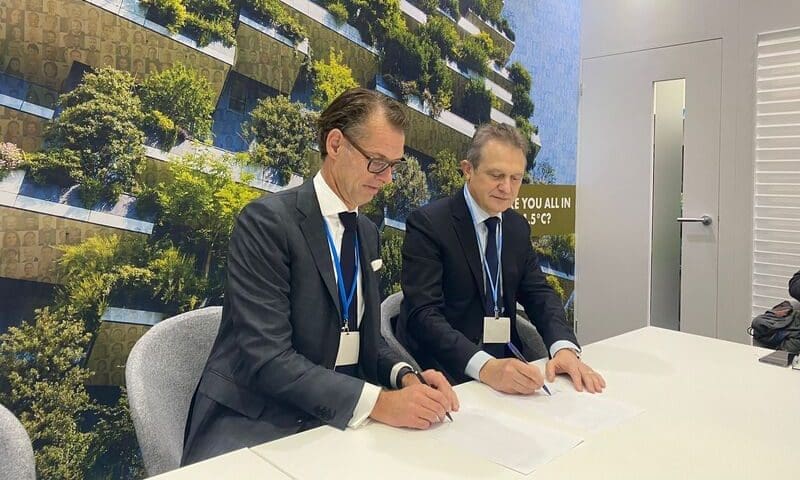
Global CEO of JBS Gilberto Tomazoni (right) and Royal DSM Co-CEO Dimitri de Vreeze at the signing of the agreement during COP 26.
JBS, the world’s largest protein sector company, has partnered with global health, nutrition and bioscience company Royal DSM to implement a development program with the goal of reducing enteric methane emissions from cattle on a global scale.
To achieve this goal, JBS will use Bovaer, a nutritional supplement developed by DSM to significantly improve the greenhouse gas footprint in the beef production value chain. Beef Central has written extensively about Bovaer’s potential for methane reduction in earlier articles – click here.
The agreement was signed at COP26 in Glasgow, Scotland yesterday.
The feed additive developed by DSM suppresses the enzyme that triggers methane production in the rumen. It has been extensively tested abroad, including in feedlots in Alberta, Brazil and Australia, and could be an important building block for CN30. The synthetic, non-toxic active compound in Bovaer (3-nitrooxypropanol, or 3-NOP), operates on a distinctly different principal to parallel methane reduction work happening in the development of asparagopsis seaweed feed additives for cattle. The development of Bovaer took place over 10 years, with 45 on-farm trials in 13 countries across four continents, which resulted in more than 48 peer-reviewed studies published in independent scientific journals. Early September 2021, Brazil was the first market to grant full regulatory approval for Bovaer.
Bovaer is added to animal feed, with the potential to reduce up to 90 percent of enteric methane emissions, as proven recently in an Australian beef feedlot study.
A quarter of a teaspoon of the additive a day, per animal, inhibits the enzyme that activates the production of methane gas in the stomach of the ruminant. According DSM, the effect is immediate and, if use is interrupted, the emission of gases is fully summarised.
DSM and JBS together will develop the implementation of Bovaer in the production chain. The objective is to promote a transition of the global beef industry, led by JBS, to obtain, through nutrition, a safe path to reduce methane emissions.
“Sustainability is at the core of our business strategy. We are developing a major action plan to reduce the Company’s entire carbon footprint, and this partnership with DSM will contribute not only to our plans but for the whole sector in this complex issue of methane emissions”, says Gilberto Tomazoni, Global CEO of JBS.
Dimitri de Vreeze, Co-CEO and Member of the Managing Board at Royal DSM said: “DSM is pleased to work with JBS on Bovaer.
“We can now truly start to create an impact in Brazil, which is exciting news, particularly within the context of COP26, where the importance of fast climate action through reduction of methane emissions is emphasized again. We are looking forward to offer a scientifically proven effective solution to the challenge of methane emissions by farming. The food systems and climate crisis are intrinsically linked, addressing the challenge of sustainable animal farming for a healthy planet is pivotal.”
To achieve this goal on a global level, JBS and DSM defined an end-to-end program to develop, build and test the supplement in JBS’ operations. Initially, the nutritional solution will be provided to the confined cattle. After six months, the tests will be expanded to a second market, which could be Australia or the United States, two of the JBS’s biggest operation worldwide.
The plan includes the development of methodologies to create assessment tools throughout the entire cycle of the JBS chain, with the technical participation of academic and research institutions.
Net Zero 2040 Commitment
This partnership with DSM to reduce methane in the value chain is part of a bigger plan. In March of this year, JBS made a commitment to become Net Zero, which means to zero the net balance of greenhouse gas emissions by 2040.
Among the actions to achieve Net Zero, JBS will invest US$1 billion by 2030 to decarbonize all direct and indirect operations and another US$100 million in research to develop solutions that make agriculture increasingly sustainable. The Company will also link executive bonuses to climate goals.
To reduce methane in the livestock chain, JBS also works on other solutions in partnership with the Institute of Animal Science and Pastures of Sao Paulo’s State Department of Agriculture and Food Supply.
Source: JBS, DSM

Congratulations to all.
this is an example of how components of nature can help heal the impact of man on the planet, or in this case cattle.
Is this compound a competitor of the asparagopsis seaweed product, or are the two complementary? Seems to me that it would be a lot easier to produce industry-scale volumes of methane inhibiting feed additive compound in a factory, rather than having to farm it as seaweed.